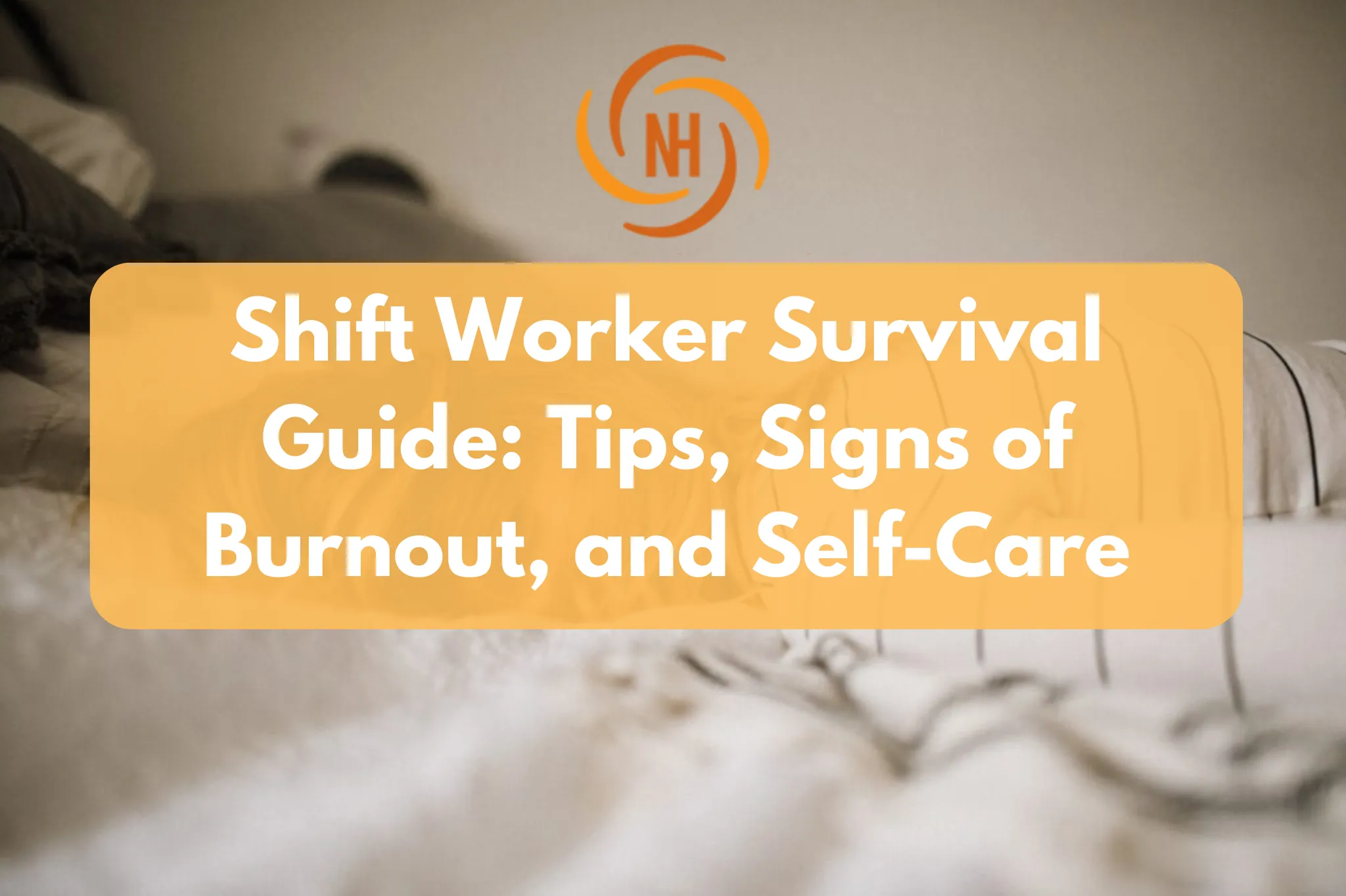Shift Worker Survival Guide: Tips, Signs of Burnout, and Self-Care
Has juggling the demands of shift work got you experiencing burnout? Are you struggling to find a balance between your job and personal life? Well, you’re not alone.
We’ve crafted this shift worker survival guide to give you practical tips, help you recognise signs of burnout, and emphasise the importance of self-care.
From finding the right schedule to fueling your body and mind, this article will help you to take control of your shifts and prioritise your own needs.

Finding the Right Schedule
Experiment with different schedules to find what works best for you, ensuring that you can maintain a healthy work-life balance as a shift worker.
Shift work can have a significant impact on mental health, so finding a routine that suits your needs is crucial. Start by experimenting with different routines and see how they affect your energy levels, sleep patterns, and overall well-being.
Some people find that working consecutive days followed by consecutive days off works well for them, while others prefer rotating shifts. It’s also important to consider the impact of night shifts on your mental health and explore strategies to mitigate any negative effects.
Fueling Your Body and Mind
Take the time to prioritise your well-being by fueling your body and mind with nutritious snacks and meals during your shift. Here are some tips to help you stay healthy and energised:
- Pack healthy snacks: Opt for fruits, vegetables, nuts, and yogurt to keep your energy levels up and avoid unhealthy cravings.
- Stay hydrated: Drink plenty of water throughout your shift to stay hydrated and focused. Avoid excessive caffeine, as it can disrupt your sleep.
- Practice stress management techniques: Take short breaks to stretch, breathe deeply, or practice mindfulness to reduce stress and increase productivity.
- Plan your meals: Prepare balanced meals ahead of time that include lean proteins, whole grains, and vegetables. This will ensure you have nutritious options readily available.
Recognising the Warning Signs
Pay attention to your physical and emotional well-being by recognising the warning signs of burnout. It’s important to be aware of the signs that indicate you may be experiencing burnout, as this can help you take the necessary steps to seek support and prevent further exhaustion. Here are some common warning signs to look out for:
| Warning Signs | Seeking Support |
|---|---|
| Physical and emotional exhaustion | Reach out to friends and family for support |
| Decreased productivity | Consider talking to a therapist or counselor |
| Increased cynicism or detachment | Connect with colleagues for advice and guidance |
| Frequent illness or health issues | Seek medical help if necessary |
Recognising these signs early on can help you take proactive steps to prevent burnout and prioritise your well-being. Don’t hesitate to seek support from loved ones, professionals, or colleagues who can offer guidance and assistance during challenging times. Remember, taking care of yourself is essential for maintaining a healthy work-life balance.
Nurturing Your Well-being
To nurture your well-being, it’s important to prioritise your physical and mental health. Here are some practical tips for promoting work-life balance and coping with stress:
- Take breaks and set boundaries: Allow yourself time to recharge and disconnect from work. Establish clear boundaries between your personal and professional life.
- Engage in activities that bring joy and relaxation: Find hobbies or activities that help you unwind and destress. Whether it’s reading, exercising, or spending time with loved ones, make time for what brings you happiness.
- Seek support from friends and family: Reach out to your support system when you need someone to talk to or lean on. Having a strong network can help alleviate stress and provide much-needed emotional support.
- Practice mindfulness and stress management techniques: Incorporate mindfulness practices, such as deep breathing exercises or meditation, into your daily routine. These techniques can help reduce stress and improve overall well-being.
Taking Control of Your Shifts
Take charge of your schedule by experimenting with different shifts that best suit your needs and preferences. Creating boundaries and maintaining work-life balance are essential for your well-being as a shift worker. One way to do this is by designing your own schedule. Consider using a table to visualise your options and make informed decisions.
| Shift Option | Pros | Cons |
|---|---|---|
| Morning | – Regular sleep schedule | – Early wake-up time |
| Afternoon | – More time for personal activities | – Difficulty adjusting to late shifts |
| Night | – Higher pay rates | – Disruption of natural sleep patterns |
| Rotating | – Variety in work schedule | – Frequent changes can be exhausting |
Benefits of Joining an Agency
Consider the advantages of joining an agency, such as flexible shift options and opportunities for career growth and development. Here are some benefits of joining an agency:
- Flexibility: Joining an agency allows you to choose shifts and locations that work best for you. This flexibility gives you control over your own schedule and helps you prioritise work-life balance.
- Career Growth: Agencies provide opportunities for career advancement and development. You can gain new skills, receive training, and expand your knowledge in different healthcare settings.
- Supportive Environment: Being a part of an agency means being surrounded by a supportive team. You can rely on your colleagues for guidance and assistance, fostering a positive work environment.
- Access to Resources: Agencies often provide access to training programs and resources that can enhance your professional capabilities. This support can help you deliver excellent patient care and improve your overall job satisfaction.
Joining our agency can offer you the career growth and supportive environment you need to thrive in your shift work.
Prioritising Your Own Needs
Make sure you prioritise your own needs by setting boundaries and taking care of your physical and mental well-being. As a shift worker, it’s important to find a balance between work and personal life.
Seeking support from friends, family, or even online communities can help you navigate the challenges that come with shift work.
Balancing work and personal life can be achieved by creating a schedule that allows for rest, leisure activities, and quality time with loved ones. Remember to take breaks when needed and engage in activities that bring you joy and relaxation.
Don’t be afraid to say no when necessary and set clear boundaries to protect your well-being. By prioritising yourself, you’ll be better equipped to handle the demands of your job and maintain overall health and happiness.
Remote Area Nursing
If you’re working in remote areas, you’ll encounter unique challenges and rewards while providing healthcare to underserved communities. Here are some of the challenges and unique experiences you may encounter:
- Cultural diversity: Working in remote areas allows you to interact with diverse communities, each with its own cultural practices and beliefs. It provides an opportunity to learn and adapt to different cultural settings.
- Limited resources: Remote areas often have limited access to medical supplies, equipment, and infrastructure, making it challenging to provide comprehensive healthcare.
- Building relationships: Working in remote areas allows you to build strong relationships with patients and colleagues. The tight-knit communities foster a sense of trust and appreciation for the care you provide.
- Environmental factors: Remote areas may have harsh climates, difficult terrain, or limited transportation options. These factors can pose challenges in reaching patients and providing timely care.
Despite the challenges, working in remote areas offers unique experiences and the satisfaction of making a difference in the lives of underserved communities.
Frequently Asked Questions
What Are Some Strategies for Managing Sleep and Fatigue as a Shift Worker?
To manage sleep and fatigue as a shift worker, it is important to focus on sleep hygiene. One way to do this is by creating a sleep-friendly environment. This can be achieved by keeping your bedroom dark, quiet, and cool. Another important aspect is sticking to a consistent sleep schedule, even on days off. This helps regulate your body’s internal clock.
Before going to bed, it is beneficial to wind down with calming activities such as reading or taking a warm bath. This helps signal to your body that it is time to relax and prepare for sleep. It is also important to limit exposure to bright lights and screens close to bedtime, as they can interfere with your body’s natural sleep-wake cycle.
In addition to focusing on sleep hygiene, incorporating energy-boosting exercises into your routine can help combat fatigue. Simple activities like stretching or taking short walks during breaks can help increase alertness and improve overall energy levels.
How Can Shift Workers Effectively Balance Their Personal and Professional Lives?
To effectively balance your personal and professional lives as a shift worker, work on improving your work-life balance and time management skills.
Prioritise what matters most to you and set boundaries accordingly. Create a schedule that allows for dedicated time to spend with loved ones and engage in activities you enjoy.
Practice effective time management techniques, such as making to-do lists and prioritising tasks.
What Are Some Tips for Maintaining a Healthy Diet While Working Irregular Hours?
Maintaining a healthy diet while working irregular hours can be challenging, but it’s not impossible. Here are some tips to help you out:
- Plan your meals in advance and pack healthy snacks, such as fruits or nuts.
- Avoid relying on processed foods and opt for fresh ingredients whenever possible.
- Stay hydrated by drinking plenty of water throughout your shift.
- Try to avoid excessive caffeine and sugary drinks.
How Can Shift Workers Effectively Manage Stress and Prevent Burnout?
Shift workers like you face unique challenges that can take a toll on your mental health. Coping with shift work and managing stress effectively is crucial to prevent burnout.
Prioritise self-care by setting boundaries, taking breaks, and seeking support when needed. Find healthy ways to de-stress and unwind after your shift.
Practice mindfulness and stress management techniques to maintain your well-being. Remember, taking care of yourself is essential for a healthy work-life balance.
What Are Some Unique Challenges and Rewards of Working as a Remote Area Nurse?
Working as a remote area nurse comes with unique challenges and rewards. The challenges include adapting to different cultural and environmental settings, providing healthcare to underserved communities, and facing the logistical difficulties of working in remote areas.
However, the rewards are plentiful. You get to build strong relationships with patients and colleagues, gain unique experiences and skills, and make a significant impact on the lives of those in need. It’s a fulfilling and meaningful career choice that offers personal and professional growth.







